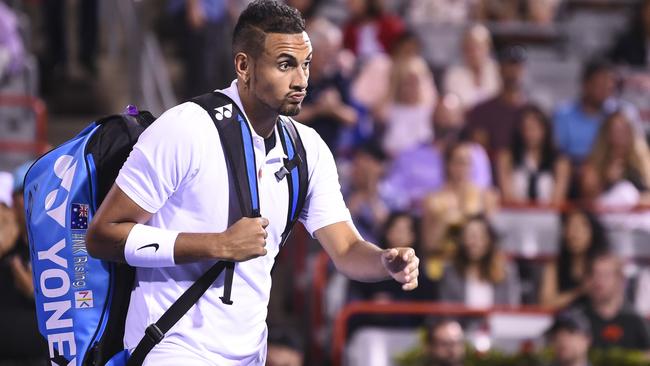Olympic boss will give Nick Kyrgios a chance to play
Australia’s Olympic chef de mission, Ian Chesterman, will give Nick Kyrgios the opportunity to mend his ways.

Australia’s Olympic chef de mission, Ian Chesterman, will give Nick Kyrgios the opportunity to mend his ways and earn selection for the Tokyo Games despite the wild thing of world tennis receiving a $167,000 fine for abusive and unsportsmanlike behaviour — and bracing himself for a ban.
Chesterman yesterday told The Weekend Australian that swimmer Mack Horton, who staged a one-man protest against China’s Sun Yang by refusing to stand on the podium at the world championships in South Korea, needed to be mindful of strict protocols for Games medal ceremonies at Tokyo.
Swimming Australia supported Horton in South Korea before FINA changed its rules to be aligned with the Olympic Charter. The key element? No protests allowed. The punishment for rebellion? No medal. Which would put the ball in Horton’s court. Would he make such a sacrifice?
Chesterman’s predecessor, Kitty Chiller, engaged in a public slanging match with Kyrgios and Bernard Tomic before the Rio Olympics. They made themselves unavailable when they were unlikely to be chosen anyway.
Chesterman was yesterday taking a more conciliatory approach, saying there’s nearly 10 months before the June 8 deadline for Olympic tennis selection. Between now and then, who’d know what might happen? The top 56 players on the world rankings get into the Games. Each country can have a maximum of four singles players. On current rankings, Kyrgios would top the eligibility as the world No 27, ahead of Alex De Minaur (38), Jordan Thompson (49) and John Millman (61).
“There is still some time before players are nominated by their sports and ultimately selected,” Chesterman said. “So we need to let that process take its course. I would hope every athlete selected would be mindful of the Olympic values and that will certainly be my expectation for the team.
“Representing our country with pride is very important for Olympians. My main focus is to give the athletes selected the best chance to do their best come Tokyo.
“I’d just like to see a healthy and happy Nick get to a stage where he can enjoy his tennis, because at his best he is one of the world’s top players, a huge talent.”
Chiller poked the bear in Kyrgios before Rio by sending him a 16-page letter demanding explanations for his transgressions. Chesterman was not putting pen to paper just yet.
“I am meeting a range of athletes through our processing sessions and will do that further when we get to announcing those team selections,” he said. “My key relationships at the moment are with the high-performance teams of the sports, including Tennis Australia, to ensure we are meeting their needs as they plan for Tokyo.”
What now for Kyrgios? In his autobiography, Serious, John McEnroe wrote that he wished he’d been suspended early in his career. Kicking him off the tour would have been the best long-term way to knock some sense into him. McEnroe was rolling in money and so fines were of no consequence. The lack of a suspension until he was 28, when he was given a two-month holiday, had cultivated McEnroe’s belief that he was above his sport. That he was a law unto himself who was allowed to transgress because it boosted the all-important crowd numbers and television audiences.
The 24-year-old Kyrgios has always been regarded as a bit of a McEnroe. He’s become worse. His three-week suspension in 2016, for tanking, was the tour’s first ban since McEnroe in 1987. It was neither here nor there because he missed no important events.
McEnroe had his moments, of course. Answer my question! The question, jerk! But while McEnroe behaved as though he mostly hated himself, Kyrgios acted in Cincinatti as if he hated everyone around him. The ATP needs to do to him what they should have done earlier with McEnroe. They need to suspend him — for his own good.
Only a fortnight ago, in Washington, Kyrgios said: “Like it or not, I’m a massive role model. I’m doing all these kids’ days at every single tournament. They’re picking me for a reason. I know deep down there’s a lot of kids that look up to me and I need to be better.”
The fine of $167,000 for eight on-court offences at the Cincinnati Masters sounded like a substantial whack but for someone who making $10 million a year in prizemoney, appearance fees and endorsements deals with Nike, Yonex and Beats, it’s chump change.
“The ATP is looking further into what happened during and immediately after the match to see if additional action is warranted under the Player Major Offense section of the code. That could result in an additional fine and/or suspension,” the game’s governing body said in a statement.
Kyrgios’s post-match disrespecting of umpire Fergus Murphy is what may earn him the suspension. Everything depends on whether the ATP thinks Kyrgios spat at Murphy, as opposed to in his general vicinity. Watch the replay. He’s not really trying to land one on Murphy’s forehead. He’s too far away, for starters. But it’s a clearly nasty act while he’s looking at Murphy and calling him a tool. To even feign a spit — he has to go.
If he was a dull player on a back court, saying and doing the exact same things, he’d be out the door. Tournament directors want him to stay on tour. He sells tickets to their events. The ATP has to rise above them.
Four years after his Rio Olympics went up in flames, Kyrgios would appear to have learnt nothing. McEnroe wrote in Serious: “The important thing is to learn a lesson every time you lose. Life is a learning process and you have to try to learn what’s best for you. Let me tell you, life is not fun when you’re banging your head against a brick wall all the time.”




To join the conversation, please log in. Don't have an account? Register
Join the conversation, you are commenting as Logout